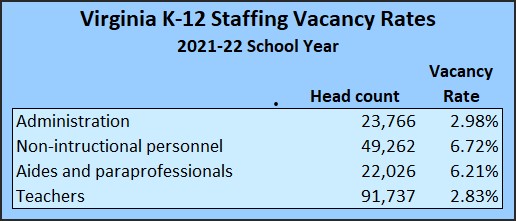
by James A. Bacon
Virginia’s teacher shortage has become so acute that it has ignited widespread inquiries into what’s causing it. The explanations proffered by establishment media fall into two buckets: (1) teachers aren’t paid enough; and (2) teachers are quitting because conservative parents are meddling in their jobs. The latest example is an article published by the Virginia Mercury, which focuses mainly on salary and compensation.
The teacher shortage is national in scope, as the Mercury rightly points out, and it is aggravated by the fact that pay is not keeping up with inflation. The article describes how school districts are competing for a limited pool of employees by offering retention bonuses, boosting benefits, and other strategies. The Mercury also alludes in passing to non-pecuniary reasons behind the teacher exodus, quoting James Fedderman, president of the Virginia Education Association.
Fedderman lays blame on culture-war issues such as LGBTQ rights and critical race theory. By way of specifics, he mentions the email tipline that Governor Glenn Youngkin said he would set up so parents could report on “inherently divisive practices” in schools. It’s been more than half a year now. Has the tipline resulted in a single action against a single teacher? Can Fedderman name one teacher who has been indisposed by the tipline? No. I’m sorry, but the tipline is not why droves of teachers are leaving schools. Give it up!
So, what are the real issues?
Bacon’s Rebellion has focused attention on poor working conditions stemming from deteriorating discipline and increasing disrespect, particularly in low-income schools. We have given the matter such prominent attention because it has been ignored so consistently in the mainstream media and so vehemently denied by commenters on this blog. But that doesn’t mean we think that deteriorating discipline is the only reason for the teacher shortages.
As new data becomes available, we will present it.
As it turns out, the Northam administration began looking into the teacher shortages last year. It began collecting data on “positions and exits” in Virginia schools, measuring the percentage of vacancies after the school year started and asking why teachers are leaving their jobs. The Virginia Department of Education now publishes a searchable database on vacancy data, effective October 1, 2011. Unfortunately, I could find no data on the reasons teachers cite for resigning. In June Secretary of Education Jillian Balow issued a memo to collect data effective June 30, 2022. That data is not yet available.
While of limited value, the “Positions and Exits Collection” does add a little to our sum of knowledge — at least as of the fall of 2021. Surprisingly, to me, teachers weren’t the biggest problem. If most vacancies are occurring among teachers this year — and we don’t know that for a fact — that’s a new phenomenon.
The biggest shortage a year ago was for bus drivers. The percentage of full-time positions unfilled was 16.0% and for part-time drivers it was 13.5%. That shortfall was well publicized last summer.
Among the four major categories of education personnel — administration, teachers, non-instructional personnel, and aides & paraprofessionals — the teacher vacancy rate was the lowest. Statewide, 2.83% of teacher positions were unfilled. That was slightly less than for administrators (2.98%). The most acute shortages were for classroom aides (6.21%) and non-instructional personnel (6.72%.)
Among non-instructional employees, high school-level mathematics specialists (11.8%), audiologists (11.5%), and psychologists (11.4%), were in particularly short supply.
There were teacher shortages in some specialty areas such as an “all other” category of math teachers (8.7%) and special education teachers not assigned to particular grade levels (5.0%). By contrast, unfilled positions for elementary school teachers varied from 1.4% in 1st grade to 3.5% in pre-kindergarten.
Those are statewide averages. When broken down by school district, there is considerable variability. I have not had time this morning to conduct a detailed analysis. Let’s just settle for noting that shortages range from a small, high-performing school district like West Point — with zero vacancies of any kind — to severely under-performing districts like Lynchburg (20% vacancies among non-instructional personnel and 29% among teachers).
News of a teacher shortage has become a perennial summer story. By hook or by crook, school districts have patched together solutions. Extensive anecdotal evidence tells us, however, that teacher burnout is worse this year and that teacher vacancies will be higher. Hopefully, the Youngkin administration will make progress in identifying why teachers are fleeing the field so school districts can address the real causes, not imagined causes like parent tiplines.

Leave a Reply
You must be logged in to post a comment.